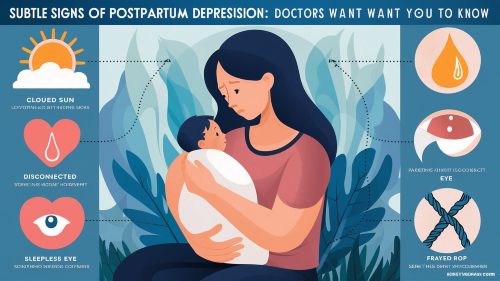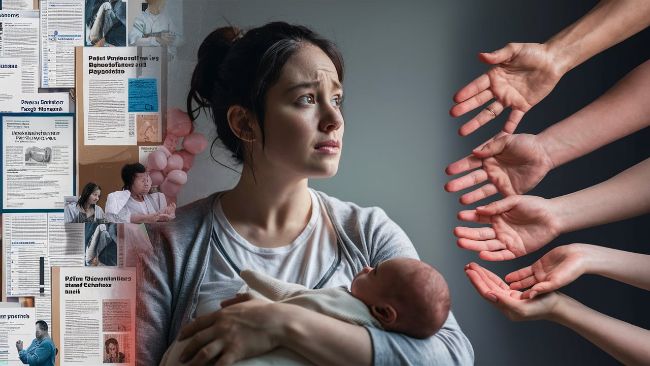Motherhood is a profound journey. It is filled with joy and love. But it can also be very challenging. Your body and mind go through huge changes. Sometimes, these changes can be overwhelming. We need to talk about mental health openly. This includes postpartum depression (PPD).
It also includes a much rarer condition. This condition is called postpartum psychosis. It is a serious mental health emergency. Understanding it is the first step. It helps us protect new mothers. It helps us save lives. This guide will explain everything. We will cover it all with care.
Note: This article is for informational purposes. It is not a substitute for professional medical advice. If you suspect you or a loved one has postpartum psychosis, seek emergency medical help immediately.
What Is Postpartum Psychosis?
Postpartum psychosis is a severe mental illness. It can happen after childbirth. It is rare. It affects about 1 to 2 in every 1,000 mothers. It is not the same as postpartum depression. It is much more serious and intense.
This condition appears suddenly. It usually starts in the first two weeks. Symptoms can show up within hours or days. A mother’s reality can change quickly. She may lose touch with what is real. This is why it is a medical emergency.
It’s crucial to know the signs. Quick action can lead to a full recovery. This is not the mother’s fault. It is a treatable medical condition. Remember, you are not alone in this. Help is available and effective.
[WordPress Feature: Use a “Separator” block here for a clean visual break.]
Postpartum Psychosis vs. Postpartum Depression: Key Differences
People often confuse these conditions. But they are very different. Knowing the differences is vital. It ensures the right help is found. Let’s look at the key distinctions. Postpartum depression is more common. It affects many new mothers.
Postpartum psychosis is a medical emergency. Postpartum depression is a serious mood disorder. The onset of psychosis is sudden. The onset of PPD is more gradual. It can appear anytime in the first year. Understanding this helps you react appropriately.
[WordPress Feature: Use the WordPress “Table” block to create this comparison. It’s great for SEO and readability.]
| Feature | Postpartum Depression (PPD) | Postpartum Psychosis (PPP) |
|---|---|---|
| Prevalence | More common (1 in 7 mothers) | Rare (1-2 in 1,000 mothers) |
| Onset | Gradual, weeks to months after birth | Sudden, days to weeks after birth |
| Symptoms | Sadness, anxiety, guilt, fatigue. | Hallucinations, delusions, paranoia. |
| Severity | A serious mood disorder. | A psychiatric emergency. |
| Thoughts of Harm | May have passing thoughts of harm. | High risk of harm to self or baby. |
| Treatment | Therapy, medication, support groups. | Immediate hospitalization, medication. |
Understanding this table is key. PPD requires professional help. PPP requires immediate, emergency help. Never wait if you suspect psychosis.
[Click to Tweet: Postpartum psychosis is not the same as postpartum depression. It is a rare and severe medical emergency that requires immediate help.]
[WordPress Feature: Add an image here. An infographic-style image comparing PPD and PPP would be very effective and shareable.]
Recognizing the Symptoms of Postpartum Psychosis
The symptoms of postpartum psychosis are alarming. They are a clear break from reality. A mother experiencing them needs help now. Do not leave her alone. Do not leave her alone with her baby. Here are the major signs to watch for.
Hallucinations
Hallucinations are seeing or hearing things. These things are not really there. A mother might hear voices. These voices might tell her to do things. She might see things that others cannot. These experiences feel very real to her.
She may seem distracted. She might talk to herself. Or she may react to unseen stimuli. This is a very distressing symptom. It is a clear sign that something is wrong. Immediate medical attention is needed.
Delusions
Delusions are strong, false beliefs. These beliefs are not based in reality. The mother cannot be talked out of them. They often have a paranoid or bizarre theme. This is a core feature of psychosis.
Common delusions include:
- Believing her baby is demonic or divine.
- Thinking people are trying to harm her.
- Believing people are trying to harm her baby.
- Feeling she has special powers.
- Thinking she is being sent secret messages.
These beliefs drive irrational behavior. They can put her and her baby at risk.
Extreme Mood Swings
Her mood can change dramatically. It can happen very quickly. She might be extremely energetic and happy. This is called mania. Then, she might crash into deep depression. She could become withdrawn and sad.

These swings are not normal. They are rapid and intense. One moment she is euphoric. The next, she is in despair. This emotional rollercoaster is confusing. It is a sign of a serious imbalance.
Confusion and Disorientation
A mother with PPP is often confused. She may not know where she is. She might not know the time or date. Her thinking is disorganized. Her speech may be rambling or illogical. It might be hard to follow her thoughts.
This confusion makes simple tasks impossible. She may forget how to care for her baby. Or she may forget to care for herself. This cognitive impairment is a major red flag.
Paranoia and Suspicion
She may become extremely suspicious. She might distrust her closest loved ones. This includes her partner and family. She may feel that everyone is against her. She might refuse food or help. She believes it could be a trick.
This paranoia isolates her completely. It makes it very hard for others to help. It is a symptom of the illness. It is not a reflection of her true feelings.
Unusual Behavior
Her behavior may seem bizarre. She might be highly agitated and restless. Or she could be completely still and unresponsive. She may refuse to eat or sleep. She may talk and move constantly.
Her actions will not make sense. They are driven by her internal reality. This strange behavior is a clear sign. It shows she has lost touch with the world around her. Immediate intervention is critical.
[WordPress Feature: Use a “Blockquote” or a “Pullquote” block for this key message.]
Important: The risk of suicide and infanticide is high with postpartum psychosis. If you see these signs, it is a life-or-death situation. Call emergency services immediately.
What Causes Postpartum Psychosis? Understanding the Risk Factors
Mothers often ask, “Why did this happen?” They might feel guilt or shame. It is vital to understand this. Postpartum psychosis is not your fault. You did not cause this. It is a complex medical illness.
Scientists believe several factors contribute. There is no single cause. It is a combination of biological and genetic factors. Let’s explore the main risk factors. Knowing them helps identify who is most vulnerable.
Personal or Family History of Bipolar Disorder
This is the single biggest risk factor. A woman with a history of bipolar disorder is at high risk. A family history also increases risk. This suggests a strong genetic link. The illness is connected to mood regulation.
If you have bipolar disorder, talk to your doctor. Do this before or during pregnancy. A plan can be made. It can help manage your risk after birth. This proactive step is very important.
Previous Episode of Postpartum Psychosis
If a mother has had PPP before, her risk is high. The chance of it happening again is about 50%. This is a very significant risk factor. It requires careful planning for future pregnancies. A strong medical team is essential.
This doesn’t mean you can’t have more children. It means you need a solid support plan. Your doctor will work with you. They will monitor you closely after delivery.
Hormonal Shifts
Pregnancy involves massive hormonal changes. Estrogen and progesterone levels are very high. After birth, these levels drop suddenly. This dramatic shift can trigger mental health issues. It disrupts brain chemistry.
For some vulnerable women, this hormonal crash is a trigger. It can set off the chain of events. This leads to the onset of psychosis. It is a biological process, not a personal failing.
Severe Sleep Deprivation
Newborns mean very little sleep. Sleep deprivation is a known trigger for psychosis. It affects anyone, not just new mothers. The first few days postpartum are exhausting. This lack of sleep stresses the brain.
For a mother at risk, this can be the final straw. It can push her into a psychotic state. Getting help with night feedings is crucial. Prioritizing the mother’s sleep is a protective measure.
[WordPress Feature: Add an image here. A simple, abstract graphic representing brain chemistry or hormones would fit well.]
This Is a Medical Emergency: What to Do Immediately
We cannot stress this enough. Postpartum psychosis is an emergency. Time is critical. Your quick actions can save two lives. If you suspect a mother has PPP, follow these steps.
[WordPress Feature: Use a “Numbered List” for these steps. This makes them easy to follow in a crisis.]
- Do Not Leave Her Alone. Her judgment is impaired. She should not be left by herself. She should never be left alone with her baby.
- Call for Emergency Help. In the US, dial 911. In the UK, dial 999. Tell the operator you suspect postpartum psychosis. Be clear that it is a psychiatric emergency.
- Go to the Nearest Hospital Emergency Room. This is the safest place for her. Doctors can assess her immediately. They can provide a safe environment for her and her baby.
- Speak Calmly and Clearly. Do not argue with her delusions. Do not try to reason with her. This can increase her agitation. Use a calm, reassuring tone. Say things like, “You are safe,” and “We are getting you help.”
- Remove Other Children from the Situation. If there are other children, have someone care for them. The situation can be frightening for them. It also allows you to focus on the mother.
- Inform the Medical Staff. Tell them all the symptoms you have seen. Mention any history of mental illness. This information is vital for a quick diagnosis.
[Click to Tweet: If you suspect postpartum psychosis, call 911 or your local emergency number immediately. It is a medical emergency.]
The Path to Healing: Treatment for Postpartum Psychosis
Recovery from postpartum psychosis is possible. In fact, the prognosis is very good with treatment. The goal of treatment is to stabilize the mother. It keeps her and her baby safe. The treatment is multi-faceted.
Hospitalization
Immediate hospitalization is usually the first step. This is not a punishment. It is a place of safety and care. It allows for 24/7 monitoring. The mother can be stabilized. The right medications can be started.
Some hospitals have special mother-baby units. These allow the mother and baby to stay together. This can help with bonding during treatment. It is a very helpful and humane approach.
Medication
Medication is a cornerstone of treatment. It helps to correct the chemical imbalances. Doctors use a combination of drugs. These may include antipsychotics, mood stabilizers, and sedatives. They help to reduce hallucinations and delusions.
These medications are very effective. They can bring a mother back to reality. Your doctor will discuss the options. They will also discuss breastfeeding and medication safety.
Therapy and Counseling
Once the psychosis is stabilized, therapy begins. This is a crucial part of recovery. Therapy helps the mother process the experience. It was a traumatic event for her. She needs to understand what happened.
Cognitive Behavioral Therapy (CBT) can help. It helps manage thoughts and feelings. Family therapy is also important. It helps the partner and family understand. It teaches them how to provide support.
Electroconvulsive Therapy (ECT)
In some severe cases, ECT may be used. This sounds scary to many people. But modern ECT is safe and very effective. It is one of the fastest ways to resolve psychosis. It is often used when medications are not working.

ECT can be a life-saving treatment. It can bring about a rapid remission of symptoms. A doctor will explain the procedure in detail. It is a powerful tool for severe cases.
[WordPress Feature: Add a relevant internal link here.]
[Internal Link: You can learn more about different therapies in our article, “Therapy Options for Postpartum Mood Disorders”.]
Recovery is Possible: Life After Postpartum Psychosis
The journey does not end with treatment. Recovery is a process. It takes time, patience, and support. Life after an episode of PPP can be challenging. But it can also be full and happy. Full recovery is the expected outcome.
The Recovery Journey
Recovering from psychosis is like recovering from any major illness. There will be good days and bad days. It is important to be kind to yourself. You have been through a trauma. Allow yourself time to heal.
Many women feel guilt or shame. They may have gaps in their memory. They worry about bonding with their baby. These feelings are normal. Talking about them in therapy is essential.
Building a Strong Support System
You cannot do this alone. A strong support system is vital. This includes your partner, family, and friends. It also includes your medical team. Peer support is incredibly helpful.
Connect with other survivors of PPP. They understand what you went through. They can offer unique comfort and advice. Organizations like Postpartum Support International have resources. They can connect you with others.
[WordPress Feature: Add a relevant external link here.]-
[External Link: Visit Postpartum Support International (PSI) for resources and support groups.]
Prioritizing Self-Care
Self-care is not a luxury. It is a mandatory part of your recovery. This means prioritizing your own needs. You must get enough sleep. You must eat nutritious food. You must take your medication as prescribed.
Gentle exercise can also help. So can activities you enjoy. Self-care helps to keep your mind stable. It prevents relapse and promotes well-being. It is the foundation of your long-term health.
[WordPress Feature: Add a serene and hopeful image here. Perhaps a sunrise or a calm nature scene.]
How to Support a Loved One with Postpartum Psychosis
Watching a loved one go through this is terrifying. You might feel helpless and scared. But your support is one of the most important factors in her recovery. Here is how you can help.
Educate Yourself
Learn everything you can about PPP. Read articles like this one. Understand that this is a medical illness. It is not her fault. Knowing the facts helps you to be a better advocate. It also helps you manage your own fears.
Offer Practical Help
New mothers need practical support. This is even more true during recovery. Help with the baby. Cook meals. Clean the house. Run errands. Take care of night feedings so she can sleep. This practical help reduces her stress.
Listen Without Judgment
She needs to talk about her experience. Listen to her with empathy. Do not judge her or her thoughts. Do not say things like, “You should be happy.” Validate her feelings. Say, “That sounds incredibly difficult.”
Encourage Professional Help
Make sure she attends her appointments. Ensure she takes her medication. Therapy is a long-term commitment. Encourage her to stick with it. Your support makes a huge difference. You are part of her treatment team.
Watch for Warning Signs
Be aware of any signs of relapse. This includes changes in her mood, sleep, or behavior. If you are concerned, contact her doctor immediately. Your vigilance is a safety net. It helps to keep her healthy and safe.
Frequently Asked Questions (FAQ)
[WordPress Feature: Structure this section for an FAQ Schema plugin. Each question would be a toggle/accordion on the live site.]
Q1: Can postpartum psychosis be prevented?
For some women, yes. If you have a major risk factor like bipolar disorder, a plan can be made. Your doctor might start preventative medication. This can happen right after you give birth. This proactive care can greatly reduce the risk.
Q2: How long does postpartum psychosis last?
The acute phase, with treatment, usually lasts a few weeks. The recovery period is much longer. It can take 6-12 months or more to feel fully yourself again. Patience is key.
Q3: Will I be able to bond with my baby?
Yes. It may take time. The illness can disrupt bonding. But with recovery, love and attachment will grow. Mother-baby units and therapy can help. Do not lose hope on this. The bond can be strong and beautiful.
Q4: Can postpartum psychosis come back?
Yes, there is a risk of recurrence. The risk is about 50% in future pregnancies. However, this risk can be managed. With a good medical plan, many women have healthy subsequent pregnancies.
Q5: Is it safe to breastfeed with the medication?
Many medications used for PPP are safe for breastfeeding. Your doctor will discuss this with you. They will choose a medication that is effective for you. They will also consider the safety of your baby. The benefits of breastfeeding can often be maintained.
A Final Word of Hope
Postpartum psychosis is a frightening illness. It is one of the most severe challenges a new mother can face. But there is so much hope. It is temporary. It is treatable. And you can make a full recovery.
If you are a mother who has survived this, you are a warrior. If you are a loved one supporting a mother, you are a hero. The most important message is this: you are not alone. Help is real, and recovery is the expectation.
Reach out for help. Talk about your experience. Break the stigma. Your story can light the way for another mother. You can emerge from this darkness. You can find the joy in motherhood again.
